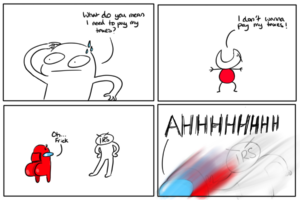One of the most common rhetorical themes in this war is the way in which this conflict is going to define the current generation. Mostly, this is used as a way to express confidence in our soldiers fighting in Iraq, although it has also been used to highlight the importance of protesting the war.
The problem with this argument is simple. However important the war is, it is not in any danger of defining our generation. Those of us of college age are for the most part completely disconnected from the war.
Of course, the impact on those fighting will be as great as in any war. However, in earlier conflicts, the experience of war was shared by everyone. In World War II, the entire generation contributed all they had to the war effort. In Vietnam, there were as many soldiers overseas, but the long duration and nature of the ground war meant that all were still contributing and everyone had friends and family at the front lines.
Now, there is a smaller connection between the war and the people. If this war is to define our generation, how can business as usual still go on, almost no different from before the war? Admittedly, this disconnection from the battle is easier to feel at a college, but in this war, it extends far beyond the boundaries of campus.
Our generation, as a whole, has had little direct impact on the events of the war and even less on the decision to go to war.
This may be a part of a larger phenomenon, however. Those of us under the age of 30 have never really had a defining moment As opposed to the World Wars, the Depression, or the Cold War, there have been few things that have affected all of us. We might have grown up on the same music or TV shows, but one can hardly say that these cultural bonds have united us.
We are a generation disunited – and this may not be a bad thing.
Our disunity has allowed for more individualism. Many people bemoan the rise of corporate culture, but at the same time, those under the label of Generation X or Y have been able to express themselves in ways never thought of before.
Because of this, the decisions we make in the future will not be shaped – for better or for worse – by some common event, but rather will increasingly reflect individuality.
This movement toward real self-determination may bring about the true birth of liberalism and rationalism, which so many thinkers have spent the last century pronouncing dead. War in Iraq may not be the first war in a “new world order,” but the last war in the long, long era of mass thought.
Brown can be reached at cbrown@campustimes.org.

